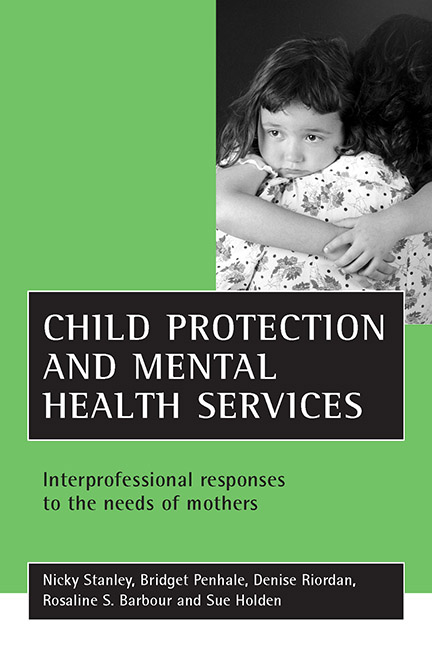Book contents
- Frontmatter
- Contents
- List of tables and figures
- Introduction
- one Mental health needs and mothering
- two The service context
- three Interprofessional work
- four The research study
- five Identifying key research issues
- six Mothers’ perspectives
- seven The mothers’ evaluations of professional support
- eight The professionals and their practice
- nine Conceptualising needs and evaluating risk
- ten Interprofessional communication and coordination
- eleven Identifying appropriate resources
- twelve Conclusion
- References
- Index
- Also available from The Policy Press
six - Mothers’ perspectives
Published online by Cambridge University Press: 20 January 2022
- Frontmatter
- Contents
- List of tables and figures
- Introduction
- one Mental health needs and mothering
- two The service context
- three Interprofessional work
- four The research study
- five Identifying key research issues
- six Mothers’ perspectives
- seven The mothers’ evaluations of professional support
- eight The professionals and their practice
- nine Conceptualising needs and evaluating risk
- ten Interprofessional communication and coordination
- eleven Identifying appropriate resources
- twelve Conclusion
- References
- Index
- Also available from The Policy Press
Summary
Constructing the sample
This chapter reports on the interviews undertaken with mothers with mental health problems in the two study sites, A and B. While there has been significantly more readiness in recent years to acknowledge and identify differing professional perspectives in work with families with mental health needs (Falkov, 1998; Weir and Douglas, 1999; Reder et al, 2000a), the consequences of these differences for families have not as yet been fully explored. That research which explores the perspectives of parents with mental health needs has emphasised parents’ experiences of being pathologised by services (Hugman and Phillips, 1993) and of services being targeted on crises rather than delivered in a preventive or aftercare form (Green and Hyde, 1997). Our study aimed to interrogate service users’ experience of both mental health and child care services in more depth and to examine need alongside attitudes to services.
For this stage of the research, health and social services staff in the two study sites were asked to identify mothers whose children had been the subject of a child protection case conference in the previous 18 months and who had a diagnosis of mental illness. This could be a diagnosis provided by any health professional and could include diagnoses of personality disorder and repeated episodes of self-harm, but not diagnoses of substance misuse alone. Fewer interviews took place in site B, despite repeated attempts by local practitioners to recruit appropriate interviewees for the study. In this area, in particular, a number of practitioners from different agencies identified the same women as potential participants: this might be explained by the smaller size of the locality.
A total of 11 women were interviewed across both sites using a structured interview schedule devised by the research team. This schedule was developed with the help of the project advisory groups in each site. Representatives from service user groups were included on both steering groups, and their comments were particularly valuable in relation to the development of these interview schedules. An initial pilot interview was completed with one mother and the schedule was refined in the light of her feedback.
A second series of slightly less structured interviews was undertaken after a period of at least six months. A total number of eight second-stage interviews were completed. Three of the original sample proved unwilling to be interviewed or inaccessible (one having moved out of the area).
- Type
- Chapter
- Information
- Child Protection and Mental Health ServicesInterprofessional Responses to the Needs of Mothers, pp. 55 - 64Publisher: Bristol University PressPrint publication year: 2003



